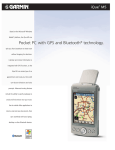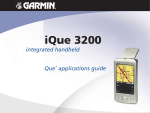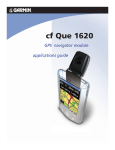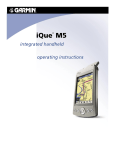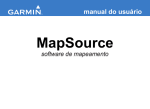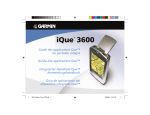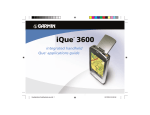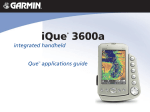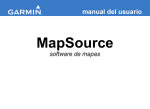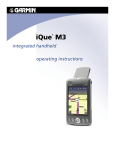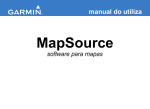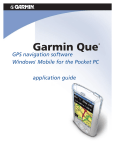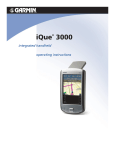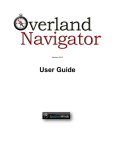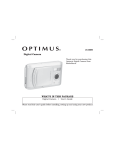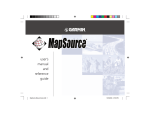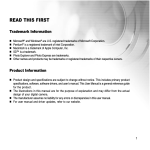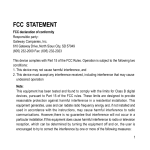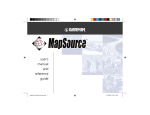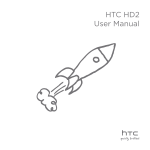Download - Gawisp.com
Transcript
Garmin Que ® GPS navigation software for Palm OS® powered devices applications guide © Copyright 2005 Garmin Ltd. or its subsidiaries Garmin International, Inc. 1200 East 151st Street, Olathe, Kansas 66062, U.S.A. Tel. 913/397.8200 or 800/800.1020 Fax 913/397.8282 Garmin (Europe) Ltd. Unit 5, The Quadrangle, Abbey Park Industrial Estate, Romsey, SO51 9DL, U.K. Tel. 44/0870.8501241 Fax 44/0870.8501251 Garmin Corporation No. 68, Jangshu 2nd Road, Shijr, Taipei County, Taiwan Tel. 886/2.2642.9199 Fax 886/2.2642.9099 All rights reserved. Except as expressly provided herein, no part of this manual may be reproduced, copied, transmitted, disseminated, downloaded or stored in any storage medium, for any purpose without the express prior written consent of Garmin. Garmin hereby grants permission to download a single copy of this manual onto a hard drive or other electronic storage medium to be viewed and to print one copy of this manual or of any revision hereto, provided that such electronic or printed copy of this manual must contain the complete text of this copyright notice and provided further that any unauthorized commercial distribution of this manual or any revision hereto is strictly prohibited. Information in this document is subject to change without notice. Garmin reserves the right to change or improve its products and to make changes in the content without obligation to notify any person or organization of such changes or improvements. Visit the Garmin web site (www.garmin.com) for current updates and supplemental information concerning the use and operation of this and other Garmin products. Garmin® and MapSource® are registered trademarks and Que™ is a trademark of Garmin Ltd. or its subsidiaries and may not be used without the express permission of Garmin. The Palm OS, HotSync, Palm Powered logo are registered trademarks and Palm Powered is a trademark of Palm Trademark Holding Company, LLC. Other brands may be trademarks of their respective owners. October 2005 Part Number 190-00523-00 Rev. B INTRODUCTION > INTRODUCTION About the Manuals Garmin Que™ is designed to use Garmin GPS technology as applications with a PDA to provide you with navigational guidance. Garmin Que is provided with three instructional guides. Setup Guide The Setup Guide gives you software installation instructions, and other important details. Before reading the other manuals, read the Setup Guide which is included with the Installation Disk. Quick Start Guide The Quick Start Guide tells you how to get started navigating with a convenient reference for basic features. You can carry this with you as a quick reminder of how features operate and how to access them. The Quick Start Guide is printed on the reverse side of the Setup Guide. Application Guide This Application Guide describes, in detail, how to use the Garmin Que™ application for navigation. Included on the setup Disk, this document is in portable document file (pdf) form, it can be printed from a PC as a paper copy which may be of benefit when you take your device outside to navigate. (Available only on the setup Disk and the Garmin website: www.garmin.com.) Editor’s Note: The above manuals and guides were created using the Garmin Que operating software installed on a PDA equipped with popular features and operating with the various versions of Palm OS® v 5. If your make and model PDA meets the requirements stated on the product packaging, it should operate in a manner similar to that described in these guides, but may not include some features discussed in the applications guide. Many PDA features described in this guide are not essential to operation of Garmin Que and are used primarily as convenient alternate methods of operation. About Garmin Que Setup Once installed on your PDA and in communication with the remote GPS receiver, QueSetup can be accessed from the PDA applications launcher. The QueSetup page provides you with the Que Software version, the remote GPS receiver i.d and version numbers, and Uninstall and Reinstall buttons. Uninstall removes the Que applications completely, while Reinstall prepares for the PDA for upgrades or reinstallation without removing existing voice files or the waypoints list. IMPORTANT NOTE: The Garmin Que has been tested and found to operate in a satisfactory manner when installed in Palm OS powered PDAs and Mobile Phones that meet the minimum operational requirements stated on the product package and on page i of this guide. However, Garmin has no responsibility for the quality or the reliability of performance of those products. A significant issue is the variance in maximum speaker volume for PDAs of different manufacturers. You may find the speaker volume of your PDA to be compromised by road noise and its location in your vehicle when receiving turn-by-turn voice direction prompts while navigating with Garmin Que. It is therefore recommended that you activate the “Attention Tone” feature to prepare you to listen in advance for each voice prompt. Instructions for activating the “Attention Tone” are found on Page 17 of this Guide. Other remedies may be third party devices that can amplify the speaker volume when connected to the auxiliary speaker port of your PDA. Consult your PDA retailer for information concerning these devices. Touch-screen responsiveness for some Garmin Que operating features may vary from PDA to PDA. It is also important that you understand the operation of your PDA prior to using Garmin Que. The operation of the Garmin Que application requires understanding of standard procedures used for the PDA that are not discussed in detail in the Garmin Que Application Guide. If you purchased your PDA at the same time as the Garmin GPS receiver and are not yet familiar with its operation, it is recommended that you learn how to operate the PDA first. Que for Palm OS - Applications Guide I INTRODUCTION > Warnings and Precautions CAUTION: Use Garmin Que™ at your own risk. To reduce the risk of unsafe operation, carefully review and understand all aspects of this Application Guide—and thoroughly practice operation using the simulator mode prior to actual use. When in actual use, carefully compare indications from Garmin Que™ to all available navigation sources, including the information from other NAVAIDs, visual sightings, charts, etc. For safety, always resolve any discrepancies before continuing navigation. CAUTION: It is the user’s responsibility to use this product prudently. This product is intended to be used only as a navigational aid and must not be used for any purpose requiring precise measurement of direction, distance, location or topography. This product should not be used as an aid to determine ground proximity for aircraft navigation. CAUTION: The electronic chart is an aid to navigation and is designed to facilitate the use of authorized government charts, not replace them. Only official government charts and notices to mariners contain all information needed for safe navigation – and, as always, the user is responsible for their prudent use. MAP DATA INFORMATION: One of the goals of Garmin is to provide customers with the most complete and accurate cartography that is available to us at a reasonable cost. We use a combination of governmental and private data sources, which we identify as required in product literature and copyright messages displayed to the consumer. Virtually all data sources contain inaccurate or incomplete data to some degree. This is particularly true outside the United States, where complete and accurate digital data is either not available or prohibitively expensive. WARNING: The Global Positioning System (GPS) is operated by the United States government, which is solely responsible for its accuracy and maintenance. The system is subject to changes which could affect the accuracy and performance of all GPS equipment. Although Garmin Que™ is a precision electronic NAVigation AID (NAVAID), any NAVAID can be misused or misinterpreted and, therefore, become unsafe. WARNING: This product, its packaging, and its components contain chemicals known to the State of California to cause cancer, birth defects, or reproductive harm. This Notice is being provided in accordance with California’s Proposition 65. If you have any questions or would like additional information, please refer to our web site at http://www.garmin.com/prop65. II Que for Palm OS - Applications Guide INTRODUCTION > Important! Because Garmin Que can be used with a PDA for vehicular navigation, important safety considerations must be observed. Please read and observe the instructions on this page. WARNING: For use in vehicles, it is the sole responsibility of the owner/operator of a vehicle equipped with a PDA with Garmin Que™ installed, to place and secure the device so that it will not interfere with the vehicle operating controls and safety devices, obstruct the driver’s view of driving conditions, or cause damage or personal injury in the event of an accident. Do not mount the PDA over airbag panels or in the field of airbag deployment. Airbags expand with a rapid force that can propel objects in their path towards the vehicle driver or passengers causing possible injury. Refer to airbag safety precautions contained in the vehicle owner’s manual. Do Not Mount Where Driver’s Field of Vision is Blocked Do Not Mount in Front of Airbag Panels Do Not Place Unsecured on the Vehicle Dash Do Not Mount in Front of an Airbag Field of Deployment Do not mount the PDA in a place where the driver or passengers are likely to impact it in a collision. The mounting hardware provided by Garmin is not warranted against collision damage or the consequences thereof. WARNING: When used in vehicles, it is the sole responsibility of the driver of the vehicle to operate the vehicle in a safe manner, maintain full surveillance of all driving conditions at all times, and not become distracted by the PDA to the exclusion of safe driving practices. It is unsafe to operate the controls of the PDA while you are driving. Failure by the driver of a vehicle equipped with a PDA with Garmin Que installed to pay full attention to operation of the vehicle and road conditions while the vehicle is in motion could result in an accident with property damage and personal injury. Que for Palm OS - Applications Guide III INTRODUCTION > Table of Contents Introduction..................................................... I About the Manuals ............................................ I Setup Guide ................................................................... I Quick Start Guide .......................................................... I Application Guide ......................................................... I About Garmin Que Setup.................................. I Warnings and Precautions .............................. II Overview ........................................................ 1 Connecting to the GPS Receiver .................... 1 Customizing the Que Units Settings .............. 2 Using the Hard Buttons to access Garmin Que applications ................................................... 3 Using the Arrow Button to access Garmin Que features .......................................................... 3 Using the QueMap Application Selector Icons5 Using the QueMap Que Menu.......................... 5 Using Preferences for QueMap ....................... 6 Location Formats and Map Datums................ 6 Marking your current location as a waypoint 7 Using QueFind .................................................. 8 Finding a City ............................................................... 9 Finding an Address ....................................................... 9 Finding an Intersection ............................................... 10 Finding Points of Interest ........................................... 11 Using Waypoints......................................................... 11 QueRoutes ...................................................... 14 Creating Routes .......................................................... 14 Using QueMap to Select a Destination ...................... 15 Using a Detour ............................................................ 15 Stopping and Resuming Route Navigation ................ 15 Customizing a Route .................................................. 16 Saving a Route ............................................................ 16 Route and Guidance Preferences ................................ 17 Using Routing Voice Prompts .................................... 17 Using QueTurns .......................................................... 18 PDA Low-Power Mode ................................... 18 Map Data Installation................................... 19 Using Map Install to Download Map Data .... 19 Using MapSource® to Download Map Data .. 19 Additional Information ................................ 20 Specifications ................................................. 20 Troubleshooting Guide .................................. 21 MapSource® Cartography........................ 22 What is WAAS? ........................................ 22 Software License Agreement .................. 22 IV Que for Palm OS - Applications Guide OVERVIEW > OVERVIEW You may customize Garmin Que to fit your needs, such as selecting the units of measure, map orientation, map detail, routing preferences and others. For now, the Que default settings should be adequate for learning how to use the applications with the exception of the units preferences explained in this section. Information on customizing each of the various Que applications is explained in the sections describing each Que application. Connecting to the GPS Receiver The wireless GPS receiver must be turned On and communicating with the PDA via Bluetooth wireless technology. It also must initialize (determine its location) before you can begin using it for navigation. When the receiver initializes Tap to open the Application for the first time it may take as long as 15 minutes. This time can be shortened by using the GPS application to select the general area in which you are currently located (see page 2). Anytime you have traveled more than 600 miles with the GPS receiver turned off, the receiver must again find its location by re-initializing. If for any reason, you have difficulty initializing your receiver, refer to the Troubleshooting Guide on page 21. The solution could be as simple as moving the receiver slightly to avoid buildings or objects that are blocking or deflecting satellite signals. When operating on battery power, the PDA normally turns off after the last key press to save power. When connected to the GPS receiver it actually switches to low-power mode maintaining communication with the GPS but turning off the display. Press the Power button to re-activate the display. • Current satellite reception informationWhile establishing a link with the GPS receiver a “ Connecting to GPS” message displays. When the GPS receiver is on and searching for satellite signals. the message “Acquiring Satellites” appears. When only enough satellite signals are being received to determine a 2D location, “2D GPS Location” displays. When enough satellite signals are being received to establish a location fix, a “3D GPS Location” message displays. When the GPS Receiver is turned off, a “GPS Off” message displays. • The location and numbers of overhead satellites. • Your current location coordinates. • The current date and time. • Your current speed. • Your approximate elevation. • The accuracy at which your location has been fixed. Acquiring Satellites To turn the receiver on and initialize it: 1. Turn On both the GPS receiver and your PDA to establish a connection. 2. Make certain the receiver’s view of the sky is unobstructed. 3. Access QueGPS from the Applications Launcher. 4. Observe the following GPS receiver status indicators on the GPS page: Que for Palm OS - Applications Guide Signal Strength Bars Position and numbers of overhead satellites 3D Location Fix 1 OVERVIEW > • The signal strength of each satellite being received. • The battery capacity, indicates power reserve when the GPS receiver is not connected to an external power source. To set your location in order to speed GPS satellite acquisition: 1. Press the Menu Key or tap the QueGPS tab to display the Options Menu. 2. Tap ‘New Location’ to display options for determining your current location. 3. Choose from Automatic, Use Map, or Cancel. 4. If you choose Map, use the stylus to tap your approximate location on the map and then tap Done. Customizing the Que Units Settings Before using the Que applications to navigate, you may want to set the units to an appropriate type of measurement for your location or navigation activity. To change the units settings: 1. From the Applications Launcher screen, tap the Prefs icon to display the Preferences Menu. 2. Under the ‘Other’ category tap Que to display the preferences for Que. 3. Tap the under the Preferences tab to display the list of Que Preferences. 4. Select Units to display the Units settings for Distance and Speed, Elevation, Depth, and Direction values. 5. Tap the beneath each unit category to display the list of measurement options for each and select your desired unit. 6. When finished, tap Done to return to the Preferences Menu. Auto Power On - allows the GPS 10 to automatically power on when power from an external source is applied. Auto Power Off - allows the GPS 10 to power off when communication with the PDA has been lost for 15 minutes. Set New Location Option Set New Location by tapping your approximate location on the map System Applications Launcher Customizing the GPS functions Before using the Que applications to navigate, you may want to set the remote GPS Receiver settings for features that can be controlled from the PDA. Connect to GPS - placing a check in this box connects the PDA via Bluetooth wireless technology to the GPS 10 receiver when the PDA is powered On. WAAS Enabled - placing a check in this box enables Wide Area Augmentation System for increased accuracy. 2 Units Setup Page GPS Preferences Page Que for Palm OS - Applications Guide OVERVIEW > Using the Hard Buttons to access Garmin Que applications Before using the Que applications to navigate, you may want to assign one or more of the Que applications to launch from a hard button. To assign a Que application to a hard button: 1. From the Applications Launcher screen, tap the Prefs icon to display the Preferences Menu. 2. Select Buttons to display the Buttons Options Menu. 3. Select a button position with a and tap to display the pick list of assignment options. 4. Tap the desired function from the pick list to assign it to the button selected in step 3. Preferences - Button Options Using the Arrow Button to access Garmin Que features Many PDAs have a four or five position button used for scrolling lists, etc. For our purposes we will refer to this button as the Arrow button. You can use this button to operate many of the Garmin Que navigation features with a Que application active. To change the Map Scale on the Map Page: With the Map Page displayed, press the Top or Bottom of the Arrow Button to increase or decrease the map scale. Hold the button down to quickly change the scale. Observe the map scale in the lower right corner of the map to determine the desired scale. To scroll any list: With an entry on the list highlighted, press the Top or Bottom of the Arrow Button. To cycle through the Que Applications: Press the Left or Right Arrow Button. To listen to spoken navigation instructions or status messages: Press and hold the Left or Right Arrow Button. Button Assignments The Arrow Button Up Left Right Down (Graphic representation, may not exactly resemble the button on your device.) Buttons Pick List Note that the button descriptions and options available may vary from PDA to PDA. Mobile phones with Palm OS offer a different array of buttons than most PDAs and those that can be reassigned are different as well. Que for Palm OS - Applications Guide 3 OVERVIEW > The QueMap application displays a detailed map of the area surrounding your current location. It allows you to pan the map with the stylus as well as view your progress when navigating. Your current location is shown as a solid black arrow. As you travel to the edge of the display, the map moves (redraws) to constantly show your current location. When in the “Track Up” mode, a north reference arrow appears at the top left corner to orient the map. Use QueMap to: • • • • Determine your current location and view your movement Locate and navigate to nearby map items Follow a route line when navigating Highlight and view information about locations on the map To Display the QueMap Application: location on the map. If that location is supported by detailed mapping data, a description briefly displays. Any point on the map can be saved as a waypoint by tapping the Waypoint marker flag in the map toolbar. The map color can automatically compensate for the difference in day and night lighting conditions. See “Using Preferences for QueMap”. The map scale can be changed to show more map area with less detail or more map detail with less area (zoom out and zoom in). Press the Up and Down keys on the front of the unit to increase and decrease the scale in single increments. To select a specific scale, use the Map Scale Selector shown at the top of this page. Map Orientation (North Up) Current location icon There are three methods to open the QueMap Application. • • • Press the Hard key you have assigned to the Que applications. Use the Left or Right Arrow keys to cycle through the Que applications until you reach QueMap. Use the Applications Launcher and tap the QueMap icon . Viewing the Map Page The Map Page is the primary screen of the QueMap application. From this page you can observe a triangular arrow that indicates your current location and direction of travel. As you move, the arrow moves with you, turning when you turn and stopping when you stop. When zoomed in the accuracy of your location is indicated by an Accuracy Circle. The smaller the circle the more accurate your location. The Map also displays detailed geographic information such as highways and roads, lakes and rivers, cities, waypoints and residential streets, depending on the detail of map data being used. Detailed maps can be loaded from map data Disk’s using the Map Install feature as explained in the “Downloading Map Data” section of this guide. There are two map orientation options: North Up and Track Up. North Up orients the map like a paper map, while Track Up orients the map in the direction of travel and can be set to display only below a desired map scale. As you travel to the edge of the display, the map moves (redraws) to constantly show your current location. When using “Track Up”, the North arrow indicates the map orientation. When the ‘Pan Map with Stylus’ mode is selected, drag the stylus across the screen to pan the map with the movement of the stylus. Tap the stylus on the map to place a map pointer on any selected 4 Map Scale Waypoint Flag (Zoom (Mark Location Scale) icon) View Area Display Information Pan Map Selector Format icon with Stylus icon Position Arrow icon The Map Page Accuracy Circle New Waypoint Page Position Arrow on Map Map Point Information Que for Palm OS - Applications Guide OVERVIEW > Using the QueMap Application Selector Icons With QueMap displayed, tap the desired selector to activate the feature as described below: Tap the Display Format icon on the map toolbar toggle between the three options of displaying and hiding the navigation data fields. Tap the Waypoint Flag on the map toolbar to display the ‘Mark Waypoint’ entry window for your current location (Position Arrow) or a ‘New Waypoint’ entry window for the Map Pointer. The window displays with a name describing the location if identified as an item in the map data or as Waypoint 1, 2, 3, etc. Full Map only Map with Navigation and Data Fields showing Tap the Information icon to display information about a location identified by the Map Pointer on the Map Page. When tapped, an information window displays describing the location if identified as an item in the map data or position coordinates (i.e. lat/lon). Tap the Position Arrow icon (vehicle pointer) to center the map on your current location when in North Up mode. When in Track Up mode, the map is centered horizontally on your location. Tap the Pan Map icon to allow the stylus to drag the map and to mark map items with the map pointer (Panning Arrow). Place the stylus anywhere on the map and then move the stylus. The map moves with the stylus and exposes the part of the map previously out of view. Lift the stylus to stop panning. To recenter your location on the map, tap the Position Arrow icon. Tap the View Area icon to allow you to define an area on the map with the stylus that will be enlarged when you lift the stylus from the screen. Select a point adjacent to the area you want to enlarge and then drag the stylus to create a box around the area. Lift the stylus to complete, allowing the map to redraw. When the View Area Selector is active the Pan Map feature is not usable. Tap the Map Scale icon to display the list of map scales. Drag the arrow to scroll through the entire list of scales. Tap the scale you want and the map will display at that scale. Map with Data Fields showing only QueMap Menu Using the QueMap Que Menu With QueMap active, tap the Menu icon to display the Que Menu. To create a route to a map point: Use the stylus to identify a point on the map, then tap Route To. To measure the distance between two points on the map: 1. Open the Que Menu and tap Measure Distance to view the Measure Distance Page. 2. To measure from your current location to a point on the map, use the stylus to tap that point. A dotted line connects the two points and the distance displays below. 3. Tap the Map Pin icon to connect two points other than your location. Measure Distance Option Que for Palm OS - Applications Guide 5 OVERVIEW > Using Preferences for QueMap Use Maps Preferences to: • Reduce “Map Clutter” by controlling the detail of how items are displayed. • Set the maximum Zoom scale at which map items display. • Control the display of multiple map features. • Determine Map orientation. • Set the display mode for day or night viewing. The factory (default) settings for these preferences allow you to operate the QueMap application with confidence. As you become more familiar with its operation, you may desire to customize the application to fit your needs. Tap the Help button for detailed definitions of the map preference options. Location Formats and Map Datums While Location preferences are not a part of Map Preferences, you may want to reset them to match those on paper maps that you plan to use in conjunction with GPS navigation. To view the Location Preferences: 1. Tap the symbol before “Maps”. 2. Tap Location to open the Location Preferences window. 3. Change the Location Format and/or Map Datum as necessary. You can display position coordinates using specific formats and datums selected from the Que Preferences, Location options. For a brief description about these preferences, tap the Help button. Detailed information about using formats and datums can be found in the “Appendix” of this guide. To view the QueMap Preferences: . 1. From the QueMap application, tap Menu icon 2. Tap Preferences. 3. View and change the preferences as needed. To open a different QueMap Preferences page, such as the Navigation Preferences, tap the symbol before “General,” as shown to the left. Map Preferences Pages are accessed by tapping the symbol to the left of the Maps option to display the list of map preferences. Each preference window is provided with a Help button to explain preference settings in detail. These pages provide an overview of the preferences available. For more information about Heading, Course, and Bearing lines, consult the Garmin website at www.garmin.com/ aboutGPS/. Most Map Preferences offer a “Text Size” option selector and a “Maximum Zoom” Selector option. Detailed map information preferences can be set to display selected detailed maps stored in the unit or on a Secure Digital (SD) or Multimedia Card (MMC). See the “Downloading Map Data” section in this guide for more information on detailed map procedures. The Miscellaneous preference options provide check boxes to allow you to turn on or off some features as you prefer. Location Preferences You may want to experiment with such features as AutoZoom (sets the maximum scale for display of map items in conjunction with the map detail setting), Accuracy Circle (defines your location within the confines of the circle. Circle size is determined by map resolution and GPS receiver accuracy), and Basemap to determine your preferences. Location Formats 6 Map Datums Que for Palm OS - Applications Guide OVERVIEW > Marking your current location as a waypoint To mark your current location as a waypoint: 1. Use the stylus to tap the Waypoints icon (flag) at the base of the map. Be certain the pointer arrow is not displayed or the location on the map marked by the arrow is saved as the waypoint. 2. The Mark Waypoint window is displayed with the waypoint automatically named as “Waypoint”. (Each subsequently marked waypoint will be named “Waypoint 1, 2, 3”, etc.) 3. Rename the waypoint to one more descriptive of your location as explained at the bottom of this page. 4. To save the waypoint to the Waypoint List, tap OK. Mark Waypoint Dialog Used for saving a location as a waypoint Waypoint Marked on the Map Page 3. Observe that the ‘New Waypoint’ window has named the location as an address, intersection, or named map item if supported by data in the map database. If not supported, it names the location as Waypoint 1, 2, 3, etc. 4. Rename the waypoint. 5. If the point on the map is an address, checking the “Include Address Data” option copies the address information to the new waypoint. 6. To relocate the waypoint on the map, tap Edit. 7. To save the waypoint to the Waypoints List, tap OK. To rename the waypoint and view details about it: 1. From the New Waypoint window, tap the Edit button to display the Waypoint Map page which shows the waypoint on the map. 2. Tap the second icon at the bottom of the page to display the Details page. Enter a new name for the waypoint, add a phone number, etc. 3. Tap the third icon to display the Location page. Here you can change its map symbol, move its location and enter an altitude value if known. New Waypoint Window To save a point on the map as a waypoint: 1. With the Map displayed, use the stylus to tap a desired location on the map which causes the map pointer to display. If the point on the map where you tapped has descriptive information in the map database, it displays for six seconds. 2. Once the map pointer is at the desired location, tap the Waypoint Flag at the bottom of the map to display the ‘New Waypoint’ window. Waypoint Map Page Waypoint Details Page Que for Palm OS - Applications Guide Waypoint Location Page 7 OVERVIEW > Using QueFind The QueFind Application displays lists of geographic points in the map database and downloaded detailed maps. Use the QueFind application to achieve one of the tasks listed below: • Use existing lists of map data items such as Waypoints, Cities, and Points of Interest to find desired destinations and navigate to them using the QueRoutes application. • Find items contained in the map data and in the Address Book. • View details about items, such as addresses and telephone numbers. • Find an item to use as a destination for a route. To open the QueFind Application: There are three methods to open the QueFind Application. • Press the Hard key you have assigned to the Que applications. • Use the Left or Right Arrow keys to cycle through the Que applications until you reach QueFind. • Use the Applications Launcher and tap the QueFind icon . Once the QueFind application is displayed, tap the icon of the category in which you want to find items. To select and view an item from a QueFind Category: 1. Once you have selected a category from the display of Find icons, the Find Items List is displayed. 2. You may choose a search method for an item. If the map pointer is present on the map page, Near Map Pointer is available to allow you to search for items near the map pointer. If on an active route, Near Route Destination and Near Current Route are available. 3. You can shorten your search list by entering the name of the item at the top of the page in the “Name” or “Containing” field. 4. When the list is displayed, highlight a single item. 8 5. Then tap Details to display an information page that provides a map showing the item location, the distance from your current location, the item name along with item type, address and phone number (if available). Tap Done to return to the list or the Save Waypoint button to save it on the Waypoints list. Palm OS® Find is a Palm OS® application for finding items within the Palm OS® (Operating System). Tap this to find an Address Book item, etc. Search Methods when navigating a route Enter a distance range to search around the current route 6. Tap Route To to generate a route to this item. 7. Tap Done to return to the previous QueFind page. Que for Palm OS - Applications Guide OVERVIEW > Finding a City To select a city from the Cities List: 1. Tap the QueFind icon then tap Cities to view the Cities List. 2. Choose a search method by selecting from ‘Near Current Location,’ ‘By Name,’ or ‘Near Other’ options. If the map pointer is present on the map page, ‘Near Map Pointer’ is available to allow you to search for cities near the map pointer. The Near Other option allows you to designate a map item and then search for cities near that item. Tap the Menu button to display the drop down options list where can use either the Que basemap or downloaded detailed maps to find a city. Tapping ‘Find Near Selected Item’ displays only cites near a map item of your choice. 3. Shorten your search list by entering the name of the city at the top of the page in the ‘Name’ or ‘Containing’ field. 4. When the list is displayed, highlight a single city. 5. Tap the Details button to display an information page that provides a map showing the city location on the map, the distance from your current location, and city name along with state and country information. The title of the page identifies the size category of the city (if that information is available). Tap the Done button to return to the list or the Save Waypoint button to save it as a waypoint on the Waypoints list. 6. With the city highlighted on the list, tap Route To to generate a route to it. 7. Tap Done to return to the previous QueFind page. City Details Cities List with search methods Map Page menu Que for Palm OS - Applications Guide Finding an Address To find an address: 1. From the QueFind application, tap the Addresses icon to display the Addresses page. 2. If you know the QueFind Address Entry Fields region (state, province), city, or postal code of the address, enter them now to limit the search results and the choice of street and city names. To enter the regions, city or postal code, tap the selector trigger, then tap an item in the list. If you select a city, the region field is hidden; to show the region field again, tap the city name and tap the Use All button at the bottom of the ‘Select City Name’ dialog box. To again search all regions or postal codes, tap on the region or postal code selector trigger and then tap the Use All button at the bottom of the dialog box. 3. Enter the desired street number in the “Number” field. 4. Tap the street field to display the ‘Select Street Name’ dialog box. Begin entry of the street name. When the desired name of the street is displayed, tap it to place it on the page. Street names are entered and selected using only the body of the street name, For example, if the street portion of the address you are finding is “E. Main St”, enter only “Main” and select “Main” from the list. Likewise if the street portion of the address City Details is “N 13th Ave” enter only “13th” and select “13th” Info Page from the list. Tap the Prefix/Suffix button to display options for the street prefix and suffix. If there is no prefix or suffix to be added, select None. After you have made your selections, tap OK to return to the QueFind Addresses page. 5. Tap the Search button to display the list of matches. 9 OVERVIEW > Finding an Intersection To find an intersection: 1. From QueFind, tap the Intersections icon to display the Find Intersections page. 2. If you know the region (state/province), city, or postal code of the address, enter them now. These will be used to limit the search results, as well as limit the choice of street and city names. To enter the regions, city, or postal code, tap the field and tap an item in the list. If you select a city, the region field is hidden. To show the region field again; tap the city name and tap Use All. To again search all regions or postal codes, tap the region or postal code field and then tap Use All. 3. Tap the ‘Street 1’ field to display the ‘Select Street Name’ dialog box. Begin entry of the street name. When the desired name of the street is displayed, tap it to select it. Street names are entered and selected using only the body of the street name. For example, if the street portion of the address you are finding is “E. Main St”, enter only “Main” and select “Main” from the list. Likewise if the street portion of the address is “N 13th Ave” enter only “13th” and select “13th” from the list. Tap the Prefix/Suffix button to select the remainder of the street name if applicable. 4. Repeat the step above for the second street (Street 2). 5. When the two fields are completed, tap the Search button to display the list of matches. List of matches for an Address Find Intersection Entry Dialog List of Matches for Entry Intersection Detail Information Page 10 Que for Palm OS - Applications Guide OVERVIEW > Finding Points of Interest The amount of information available in the All Points of Interest category is so extensive it is divided into smaller categories to refine your search. Using Waypoints A waypoint is a location that has been saved, such as your home or school. Any QueFind location can be saved as a waypoint. To learn specific information about saving a location as a waypoint, refer to the instructions on the following page. To find a waypoint using QueFind: 1. Tap the QueFind icon, then tap the Waypoint icon to view the Waypoints List. To narrow the list, tap the icon under the QueFind tab to display those waypoints nearest your location. 2. To view information for a highlighted waypoint, tap Details. To create a route to a waypoint, tap Route To. 3. Tap Done to close. To use QueFind Points of Interest: 1. Tap the QueFind icon to display the QueFind application. NOTE: The categories “Manmade Places” through “Tides” are specific to only certain types of detailed maps (other than City Select). These types of maps must be purchased separately. Consult your Dealer or the Garmin web site (www.garmin. com) for information about map options. 2. Tap the desired category to display the list of items in that category or the entry dialog for Addresses or Intersections. 3. If you selected a category with a list, you are given a choice of displaying items by name or only those near your current location. You can further refine your search by selecting a sub-category from the “All-Types” list. 4. Tap the desired subject to display the refined list. 5. With the list displayed, highlight a single Point of Interest item. 6. Tap Details to display an information page showing a location map and detailed information about the item. 7. After you have viewed details about a Find item, that item is added to the Recently Found Places list to simplify the process for reviewing. To review an item, tap Recent Finds to display the list. Que for Palm OS - Applications Guide Waypoint List Waypoint displayed on the Map Page 11 OVERVIEW > To edit a waypoint using the Waypoints List: 1. Launch the QueFind Application then tap the Waypoint icon to view the Waypoints List. 2. Tap the waypoint to highlight it and then tap Details to display the first of three details pages, the Waypoint Map page. 3. Tap the second icon at the bottom of the page to display the Waypoint Information page. The text entries on this page can be edited, such as entering a phone number or changing the waypoint name. 4. Tap the third icon to display the location information page where you can edit the waypoint symbol, the location and altitude. To edit a waypoint Symbol: 1. From the Location Information Page tap the Symbol selector to display the ‘Select Symbol’ list. 2. Scroll through the list until you find the symbol that you want to associate with the waypoint. 3. Tap the desired symbol and then tap OK to assign the symbol. 4. Tap OK to use the selected symbol or Cancel to keep the current symbol. To change the location of a waypoint: 1. From the Location Information Page tap the Location selector to display the ‘Edit Location’ window. 2. Tap Find to use QueFind to find a new location for the waypoint. Select a Find map item and then tap OK to assign it as the new location. or...Tap Map to display the Map Page that allows you to tap anywhere on the map and designate it as the new location. A dotted line connects the new location with the old and the word “MOVE” appears below the map pointer. Tap Done to complete the move. To change the altitude of a waypoint: 1. From the waypoint Location Information Page, highlight the Altitude entry. Enter a new altitude if you have a reliable source for determining the altitude for that location. 12 Waypoint Information Page Location Information Page Waypoint Symbol List Edit Location Options Moving a waypoint on the Map Que for Palm OS - Applications Guide OVERVIEW > To select a waypoint as a Route Destination using QueFind: 1. Tap the QueFind icon. 2. Tap the Waypoint icon to view the Waypoints list. 3. Highlight the desired waypoint and tap Route To. 4. Observe the route on the Map Page. Dial Phone Number query “Phone is Off” message QueFind Waypoints List with highlighted waypoint Detail page for a Point of Interest To delete a waypoint: 1. From the Waypoints List page, highlight the waypoint you want to delete. 2. Tap the Menu button to display the drop-down Waypoints List Options Menu. 3. Tap the “Delete Waypoint” option. Tap “Yes” when the delete prompt appears. The waypoint is removed from the Waypoints List. To dial the Phone Number of a Point of Interest or Waypoint: (Requires a PDA with integrated phone) 1. Tap the QueFind icon. 2. Tap the Point of Interest category icon or the Waypoint icon to view the list of items. 3. Highlight the desired item and tap Details. 4. If there is a phone number in the Phone field of the Details page and your PDA includes an integrated phone, press the phone Dial button. 5. You are then prompted to confirm that you do want to dial the number. 6. Select Yes to dial and if the phone is turned off, select Yes when the “Phone is off” message appears. 7. You can also dial the number using the stylus and the ‘Dial’ option from the Detail page drop-down menu. Waypoint List Options Menu “Dial Phone Number” option Que for Palm OS - Applications Guide 13 OVERVIEW > Using QueRoutes QueRoutes is an application that provides you with a graphic route line, plus graphic and voice turn-by-turn directions to a chosen destination. You can select a destination from any of the QueFind application categories and the QueMap application. QueRoutes functions primarily as a route management tool once you have selected a destination. Use the QueRoutes application to: • • • • • 3. The QueMap application is displayed and a “Calculating Route” animated graphic is displayed in the bottom left-hand corner of the map. When the map displays the route in magenta, the route is “active”. 4. Follow the voice prompts and turn preview pages to navigate to your destination. Recalculate the route to your current destination. Add stops or new waypoints (vias) to customize your route. Save specific routes for use at a later date. Set the preferences for routing. Stop and resume navigation of an active route. To access the QueRoutes Application: There are three methods to access QueRoutes. Press the hard key you assigned to the Que Application to access the QueRoute Applications. • Press the assigned hard key repeatedly to cycle through the Que Applications until the QueRoutes application displays. • Use the Applications launcher to access the Que Apps page and then select QueRoutes. • Creating a Route to a QueFind item Calculating Route QueRoutes with Active Route Active Route shown on the Map Creating Routes To begin a route all you really need is a destination. A route can be activated from QueFind or QueMap. To use QueFind to select a destination: 1. Select an item from any of the QueFind application search categories. Refer to the “QueFind” section of this manual for detailed instructions on searching for items. 2. Tap the Route To button at the bottom of the page. 14 Que for Palm OS - Applications Guide OVERVIEW > Using QueMap to Select a Destination You can create a route to any place on the map by using the stylus to place the map pointer on a location that you want to use as a destination. To select a destination: 1. Tap the QueMap icon to display the Map. 2. With the stylus, tap the location on the map that you want to use as a destination. 3. Tap the MENU icon to display the QueMap options menu. 4. Tap the Route To... option. 5. A “Calculating Route” animated graphic is displayed in the bottom left-hand corner of the map. When the map displays the route in magenta, the route is “active”. 6. Follow the on-screen directions, voice prompts and turn preview pages to navigate to your destination. Stopping and Resuming Route Navigation You can stop navigating a route at any time. To Stop or Resume route navigation: 1. Tap the QueRoute icon to display the ‘QueRoutes’ dialog box. 2. Tap the Stop Navigation icon to remove the route overlay from the ‘Map’ page. This also stops voice prompts and turn preview pages. 3. Start navigating again by tapping the Resume Navigation icon from the ‘QueRoutes’ dialog box. You can also ‘Recalculate’ a route at any time during navigation by tapping the ‘Recalculate’ icon from the QueRoutes Application. QueRoutes when a Route is active Route To Option from Menu Selecting a Map Item to Route To Using a Detour To avoid an area of traffic congestion or other obstacles on a route, you can use the “Detour” option to alter the route to avoid the roads used in the current route for a specific distance. QueRoutes when a Route has been stopped before completion To use the “Detour” option: 1. Tap the QueRoutes icon. 2. Tap the Detour option. 3. Tap the distance to avoid roads used in the current route. 4. Tap OK to activate the detour. 5. To cancel a detour, select the “Cancel Detour” icon from Detour Distance Options QueRoutes. Que for Palm OS - Applications Guide 15 OVERVIEW > Customizing a Route You are not limited to using a newly created route as is: You can modify it to meet your own requirements. To alter the path of travel to include various points on the way to the destination, select “Edit Vias” from the QueRoutes application. To add or change Route “Vias”: 1. While a route is active, tap the QueRoute icon to display the ‘QueRoutes’ dialog box. 2. Tap the Edit Vias icon to display the Edit Vias page. 3. Select the method of adding a via point from the options shown at the bottom of the page. “From Find” displays the QueFind application. “From Map” displays the QueMap application. 4. Use the same method to select a via point as you would a destination, the selected location now becomes a point along your current route. 5. You can move the selected via point anywhere in the list by tapping the Up/Down arrows. To Save a route: 1. With a route active, tap the QueRoute icon to display the ‘QueRoutes’ dialog box. 2. Tap the Saved Routes icon to display the Saved Routes List. 2. Tap the Save Active button at the bottom of the page. 3. A “Save Active Route” dialog displays the route name. Rename the route if desired and then tap OK to save it to the Saved Routes List. 4. To view details about any saved route on the list, tap the route name on the list then tap the Details button to display the ‘Saved Route Details’ dialog. 5. Tap OK to close, Activate to begin navigation on that route, or Delete to remove it from the Saved Routes List. Save Active Route Dialog Via Points List and Options Menu Saving a Route Once you have created a route to a destination, while it is still active, you can save it to the “Saved Routes” list for re-use at a later date. Saved Route Details Dialog When you select a Saved Route to navigate, the route is recalculated beginning from your current location. Saved Routes List 16 Que for Palm OS - Applications Guide OVERVIEW > Route and Guidance Preferences You can control the way routes are calculated and how the route guidance prompts are given. When you set preferences for an individual route, all other routes reflect those preferences. To set routing preferences: 1. Tap the QueRoute icon to display the ‘QueRoutes’ dialog box. 2. Tap the Route Preferences icon to display Route Preferences. 3. Tap the icon beneath the ‘’ option to display and select from three options. The ‘Off Road’ option generates a straight line to your destination, not following roads. 4. Tap the icon beneath the ‘Calculate Routes For’ option to display and select from a list of transportation options. 5. Tap the box next to the ‘Avoid’ options to toggle a check mark and activate that option. 3. Tap the icon beneath the ‘Off-Route Recalculation’ option to display and select from four options for recalculation notification. Tap Help for definitions. 4. Tap the icon beneath the ‘Turn Preview‘ option to display and select from a list of methods for turn notification. Tap Help for definitions. 5. Tap the icon beneath ‘Voice Prompt’ to select voice guidance. Tap Help for definitions. 6. Toggle the ‘Attention Tone’ box for audible notification of route changes. Tap Help for definitions. Guidance Preferences Routing Preferences To set guidance preferences: 1. Tap the QueRoute icon to display the ‘QueRoutes’ dialog box. 2. Tap the Route Preferences icon. Tap the icon preceding ‘Routing’ to display the list of other options. Select ‘Guidance’. Que for Palm OS - Applications Guide Using Routing Voice Prompts Once you have created a route to a destination you can begin navigation. In addition to a graphic in the QueMap application and “pop-up” turn displays you will be given voice prompts prior to turns and points on your route. While navigating a route, you may need to adjust the volume to compensate for road noise, etc. To adjust voice prompt volume: 1. Select the Volume menu item from any Que application. 2. Adjust the Guidance volume slider to a level appropriate for overcoming environmental noise. 3. Tap Done when completed. To listen to a turn voice prompt or GPS status message at any time, hold the left or right Arrow key on the PDA when on the main page of any Que application. Volume Adjustment Page 17 OVERVIEW > Using Que Turns QueTurns is an application that can show you a list of turn-byturn directions to a destination. The application is active only when a route is active. Use QueTurns to: • View the turns you will take while navigating the route. • View the Turn Preview for an individual turn. To open the QueTurns Application: There are three methods for accessing QueTurns. • • • Press the Hard key you have assigned to QueTurns. Use the Left or Right Arrow keys to cycle through the Que applications until you reach QueTurns Use the Applications Launcher and tap the QueTurns icon. If you are actively navigating a route, a list of turns that you will take while navigating that route is displayed. Each turn entry provides a direction arrow showing the direction to turn and the distance to that turn, plus written instructions. The time to the next turn is displayed at the top right of each turn entry and the time of day which you will reach that turn is displayed at the lower right of each turn entry. Tapping a turn on the list displays a ‘Turn Preview’ page for that turn. PDA Low-Power Mode When your PDA is linked with the remote GPS receiver and connected to external power, the PDA remains on. However, when your PDA is using its battery, it enters a low-power mode and the display turns off after the time set for auto-off expires. When you are actively navigating a route, you can still hear voice prompts and see Turn Preview pages display before each turn in the route. If your PDA includes an LED, it flashes occasionally, while in low-power mode, to indicate communication with the GPS receiver. Pressing the Power button when in low-power mode turns the PDA on. Pressing the Power button when the display is on turns the PDA off. If the connection between the GPS and PDA is lost, both units auto-power off at the end of their pre-set time out periods. When the “Connect to GPS” preference is enabled and your PDA is turned on, it attempts to connect to the GPS receiver. To disable the connection, use the drop-down menu for any Que application and select “Disconnect from GPS.” To cause the PDA to re-connect with the GPS receiver, you must once again enable the “Connect to GPS” preference, using the Que applications drop-down menus. If the connection has been disabled for more than fifteen minutes, you must also turn the GPS receiver back on. You can also adjust the “Connect to GPS” preferrence from the GPS preferences application. Turn Preview Page Turns List 18 Que for Palm OS - Applications Guide MAP DATA INSTALLATION > MAP DATA INSTALLATION Using Map Install to Download Map Data Map Install allows you to download detailed mapping data to the Palm OS handheld or a Secure Digital Card. When detailed maps are installed, Que applications, like QueFind, can provide a broader range of information about the geographic area in which you are navigating. If you do not install detailed mapping data, you will only have access to the information contained in your Que Application’s basemap. To download maps: 1. You must have first installed the Detailed Map Data Disks on your PC. Refer to the Que for Palm OS Setup Guide. 2. From your PC Desktop click the Map Install icon to open the Map Install application. 3. Read the information on the ‘Welcome’ window. It will help to determine your next step. For certain maps (like those provided with your new unit) you must use an Unlock Code to open the map data. You may have already entered the Unlock Code during the setup process and you can move to the next InstallWizard page. If not, use the sheet of paper packaged with your GPS unit that contains the code. Click the appropriate Unlock Code button to open the dialog box and follow instructions on each page that follows. 4. When finished with the UnlockWizard a “Select Device” window appears. Select the desired device for receiving downloaded map data (Que with your Palm OS device “username” attached) and the map data storage location from the drop down list, then press ‘Next’ to move to the map selection window. 5. In the map selection window, select a map region to download to your unit. Use the map selection tool to click on the map areas that you want. 6. Click Next to move to the ‘Finish’ window. A “Sending to iQue” window displays and automatically closes when the map data has been sent. The next time you perform a HotSync® operation, the map data will be moved to the Mobile Device Storage or Secure Digital Card. 19 Unlock Code Dialog Install Maps on Device Sendiing Maps Using MapSource® to Download Map Data If you own or intend to purchase additional Garmin MapSource products (other than those provided with your Palm OS handheld), you may need an unlock code to install some of these additional MapSource products. Follow unlock instructions provided in the Garmin Que for Palm OS Setup Guide. The MapSource operating software (version 5.4 and above) can be used to download maps to the PDA internal storage or a Secure Digital Card. When using the “Save To Device” feature on MapSource download maps, select the ‘Que’ option to display the ‘Save To Que’ dialog window. In the ‘Que Settings’ portion of this window, select a Location of either ‘Internal Storage’ or ‘Secure Digital (SD) Card’ and then click Send. Note: The next time you perform a HotSync® operation the map data from either type of download is transferred to the Palm OS handheld. When downloading maps, be certain to check the amount of free space available on the card to be certain there is sufficient space for the new maps. Open the Card Info application to view the available space information. MapSource map selection window ‘Save from and to Device’ buttons ‘Send to Que’ dialog box Que for Palm OS - Applications Guide ADDITIONAL INFORMATION > ADDITIONAL INFORMATION Specifications Internal System Operating System: Palm OS v 5 Application Software Garmin “Que”: GPS Info, Electronic Mapping, Automatic Route Generation, and Turn-By-Turn Voice Guidance Moving Map Features Basemap: Routable basemap contains state and country boundaries, lakes, rivers, streams, airports, cities, towns, coastlines, state and interstate highways, local thoroughfares and secondary roads within metro areas Map Data Disks: Accepts downloadable map detail from Garmin PC-based MapSource City Select™and City Navigator™ Data Disks which provide street-level detail, addresses, listings of nearest restaurant, hotels, ATMs and more. Accepts most other MapSource map data as well as U.S. Topos and Marine charts Navigation features Routes: Automatically calculated with turn-by-turn instructions; using built-in basemap, routes include interstates, highways and major thoroughfares; with detailed data from Map Data Disks, routes include residential street-level detail Specifications are subject to change without notice. 20 Que for Palm OS - Applications Guide ADDITIONAL INFORMATION > Troubleshooting Guide Symptom GPS Signal Related Problems “No GPS Connected” message. Probable Cause Remedy Connection to GPS receiver or PDA not active. Use Que Prefs or the Que menu to connect to the GPS receiver. “Connecting to GPS” message stays on. GPS receiver is not turned on. GPS receiver is not powered. GPS receiver (if wireless) is out of range. Turn On receiver. Connect power source or charge battery. Relocate closer to the PDA. “Acquiring Satellites” message stays on. GPS receiver is collecting satellite data. Wait for data to be collected. “Lost Satellite Reception” message appears repeatedly. GPS receiver cannot maintain a constant signal Antenna is incorrectly positioned. Move to location with less interference Relocate antenna for best reception. Cannot achieve reliable satellite signals when Some auto windshields are tinted using a thin the GPS receiver is mounted on my auto dash. metallic coating to reflect ultraviolet sun rays. Most vehicles with this type windshield block satellite signals as well. GPS receivers will not operate inside the vehicle. With the receiver on my auto dash, the satellite Car radios and Disk players can generate electrical Relocate the GPS receiver away from the signal reception is weak. fields that can interfere with satellite signals. radio or turn off the radio when using the Garmin Que to navigate. Map Messages at Startup or Card Insertion “Can’t Unlock Maps” You must enter the unlock code during MapSource Follow installation instructions on the setup installation. disk. “Detailed Maps Don’t Support Routing” These maps are not the type used for auto-routing. Select maps designed for auto-routing. “Too Many Maps on Data Card” The map sets you are trying to load are too Check the space available in the chosen large for the space available in the storage location. location and choose another location with enough space or reduce the map set size. Map Data Related Problems No Find Feature items listed for “By Name” options. Que. Maps that support that option are not installed from MapSource. Open MapSource and select maps from City Select version 6.5, save to Garmin “None Found” message when accessing the These options only display data from topographic Load maps of this type using MapSource Man made Places, Water Features, and Land maps and marine charts. topographic and marine chart map data. Features Find Options. Find Feature Search Messages “Select Street Before Searching” You have tapped the “Search” button before entering the name of the street for an address. Enter a street name before beginning your search for an address. “Select Two Streets Before Searching” You have entered none or only one street before Enter both street names to complete the searching for an intersection. intersection description. “None Found” This message appears when there is no data in the loaded maps matching the entry. Try a variation of the item description. If you encounter problems that you cannot solve, first determine that they are not related to operation of your PDA, then: Contact Garmin Product Support at 913/397.8200 or 800/800.1020 Que for Palm OS - Applications Guide 21 ADDITIONAL INFORMATION > MapSource® Cartography You may want to purchase additional MapSource® map data disks with maps for another country, topographic maps or marine charts. Consult your Garmin Dealer or the Garmin website (www.garmin.com) for pricing and availability. Additional MapSource map data sets can be purchased from your Garmin Dealer or on-line from Garmin. Consult your Garmin Dealer for MapSource maps compatible for use with the Garmin Que or visit the Garmin website at (www.garmin. com). What is WAAS? The Wide Area Augmentation System (WAAS) is an FAA funded service to improve the overall integrity of the GPS signal for users in North America. WAAS is just one service provider that adheres to the MOPS (Minimum Operational Performance Standard) for global Satellite Based Augmentation Systems (SBAS). Eventually there will be several services of worldwide geostationary communication satellites that broadcast integrity information and differential correction data as transmitted by ground reference stations. At this time WAAS is still in the developmental stage with a goal of providing reliable signals with an accuracy of 7 meters (21-22 feet) both horizontally and vertically 95% of the time. Current tests have shown the actual accuracy to be on the order of 2-3 meters (7-10 feet). This accuracy is comparable to DGPS (as explained below), but without the need for a separate beacon receiver. Since all SBAS systems use the same receiver frequency, any SBAS system should be capable of providing your GPS unit with increased accuracy at any location in the world when others under development reach operational status. In addition to satellites in orbit over the Earth, ground based reference stations must also be in place near the region you are located. Enabling WAAS in regions that are not supported by ground stations, which correct position data, typically, does not improve accuracy even when receiving signals from an SBAS satellite. In fact it can degrade the accuracy to less than that provided by GPS satellites alone. For this reason, your Garmin GPS receiver, when in the “WAAS Enabled” mode, uses the method that achieves the best accuracy. To enable/disable WAAS, refer to the General Settings tab of the System Setup Page of Garmin Que. For more information, go to http://gps.faa. gov/Programs/WAAS/waas.htm. 22 Software License Agreement THIS SOFTWARE IS OWNED BY GARMIN CORPORATION (“GARMIN”) AND IS PROTECTED UNDER COPYRIGHT LAWS AND INTERNATIONAL COPYRIGHT TREATIES. THIS SOFTWARE IS LICENSED, NOT SOLD. THIS SOFTWARE IS PROVIDED UNDER THE FOLLOWING LICENSE WHICH DEFINES WHAT YOU MAY DO WITH THE PRODUCT AND CONTAINS LIMITATIONS ON WARRANTIES AND/OR REMEDIES. IMPORTANT: CAREFULLY READ THIS LICENSE BEFORE USING THIS PRODUCT. INSTALLING, COPYING, OR OTHERWISE USING THIS PRODUCT INDICATES YOUR ACKNOWLEDGMENT THAT YOU HAVE READ THIS LICENSE AND AGREE TO ITS TERMS. IF YOU DO NOT AGREE, RETURN THE COMPLETE PRODUCT TO GARMIN INTERNATIONAL. INC. CUSTOMER SERVICE, 1200 EAST 151st STREET, OLATHE, KS 66062 WITHIN 10 DAYS OF THE DATE YOU ACQUIRED IT FOR A FULL REFUND. 1. LICENSE: GARMIN (“we” or “us”) provides you with storage media containing computer software (the “Program”) which may also include digital cartographic data and “online” or electronic documentation, and printed materials (together called the “Product”) and grants you a limited non-exclusive license to use the Product in accordance with the terms of this License Agreement. The copyright and all other rights to the Product shall remain with us. You must reproduce any copyright or other notice marked on the Product on all copies you make. 2. YOU MAY: a) install and use one copy of the Product on a single computer or network. This copy is to be used by only a single user at a time. If you wish to use the Product for more users, you will need an additional license for each user. b) make one copy of the Product for archive or backup purposes. c) use a copy of the Product on a home or portable computer if that copy is never loaded at the same time it is loaded on your primary computer. d) transfer the Product to someone else only if you assign all of your rights under this License, cease all use of the Product, erase or destroy any copy (including the hard disk copy) made in support of your use of the Product, and ensure that the other person agrees to the terms of this License. Que for Palm OS - Applications Guide ADDITIONAL INFORMATION > 3. YOU MUST NOT: a) make copies of the Product except as expressly permitted in Section 2 of this License. b) translate, reverse engineer, decompile, or disassemble the Product except to the extent the foregoing restriction is expressly prohibited by applicable law. c) rent, lease, loan, sub-license, distribute, assign, or transfer the Product except as set out in Section 2 (d) above. d) modify the Product or merge all or any part of the Product with another program. 4. TERM: This License shall continue for as long as you use the Product. However, this License will terminate automatically without notice from GARMIN if you fail to comply with any of its terms or conditions. You must agree, upon termination, to destroy all copies of the Product. The Limitations of Warranties and Liability set out below shall continue in force even after any termination. 4. TERM: This License shall continue for as long as you use the Product. However, this License will terminate automatically without notice from GARMIN if you fail to comply with any of its terms or conditions. You must agree, upon termination, to destroy all copies of the Product. The Limitations of Warranties and Liability set out below shall continue in force even after any termination. 5. LIMITATION OF WARRANTIES AND LIABILITY: THE PRODUCT IS PROVIDED ON AN “AS IS” BASIS, WITHOUT ANY WARRANTIES OR CONDITIONS, EXPRESS OR IMPLIED, INCLUDING, BUT NOT LIMITED TO, WARRANTIES OF MERCHANTABLE QUALITY, MERCHANTABILITY OR FITNESS FOR A PARTICULAR PURPOSE, OR THOSE ARISING BY LAW, STATUTE, USAGE OF TRADE, OR COURSE OF DEALING. THE ENTIRE RISK AS TO THE RESULTS AND PERFORMANCE OF THE PRODUCT IS ASSUMED BY YOU. NEITHER WE NOR OUR DEALERS OR SUPPLIERS SHALL HAVE ANY LIABILITY TO YOU OR ANY OTHER PERSON OR ENTITY FOR ANY INDIRECT, INCIDENTAL, SPECIAL, OR CONSEQUENTIAL DAMAGES WHATSOEVER, INCLUDING, BUT NOT LIMITED TO, LOSS OF REVENUE OR PROFIT, LOST OR DAMAGED DATA OR OTHER COMMERCIAL OR ECONOMIC LOSS, EVEN IF WE HAVE BEEN ADVISED OF THE POSSIBILITY OF SUCH DAMAGES, OR THEY ARE FORESEEABLE. WE ARE ALSO NOT RESPONSIBLE FOR CLAIMS BY A THIRD Que for Palm OS - Applications Guide PARTY. OUR MAXIMUM AGGREGATE LIABILITY TO YOU SHALL NOT EXCEED THE AMOUNT PAID BY YOU FOR THE PRODUCT. THE LIMITATIONS IN THIS SECTION SHALL APPLY WHETHER OR NOT THE ALLEGED BREACH OR DEFAULT IS A BREACH OF A FUNDAMENTAL CONDITION OR TERM OR A FUNDAMENTAL BREACH. SOME STATES/COUNTRIES DO NOT ALLOW THE EXCLUSION OR LIMITATION OF LIABILITY FOR CONSEQUENTIAL OR INCIDENTAL DAMAGES, SO THE ABOVE LIMITATION MAY NOT APPLY TO YOU. 6. RESTRICTED RIGHTS: If this Product is acquired by or for the U.S. Government, then it is provided with Restricted Rights. Use, duplication, or disclosure by the U.S. Government is subject to restrictions as set forth in subparagraph (c)(1)(ii) of The Rights in Technical Data and Computer Software clause at DFARS 252.227-7013, or subparagraphs (c)(1) and (2) of the Commercial Computer Software - Restricted Rights at 48 GarminR 52.227-19, or clause 18-52.227-86(d) of the NASA Supplement to the FAR, as applicable. The contractor/ manufacturer is GARMIN International, Inc., 1200 E. 151st Street, Olathe, KS 66062, USA. 7. EXPORT CONTROLS: You agree not to export or re-export the Product to any country in violation of the export control laws of the United States of America. 8. GENERAL: This License is the entire agreement between us, superseding any other agreement or discussions, oral or written, and may not be changed except by a signed agreement. This License shall be governed by and construed in accordance with the laws of the State of Kansas, United States of America. If any provision of this License is declared by a court of competent jurisdiction to be invalid, illegal, or unenforceable, such a provision shall be severed from the License and the other provisions shall remain in full force and effect.Index 23 INDEX INDEX A Accuracy Circle 4, 6 Acquiring Satellites 1 Active Route 14 Addresses 7 All Points of Interest 11, 17 Altitutude (Elevation) 2, 12 Audio (Voice Prompts) 17 Auto-Zoom 6 Automatic Route Calculation 17 Avoidance 15, 17 B Buttons 3, 6 By Name, Search 8 C Calculating a Route 14 Cities Finding By Name 9 Information Page 9 Near Current Location 9 View on Map 9 Color Mode, Map 6 Containing, Search for 8 Current location (Position Arrow) 4, 5 D Deleting A Route 16 A Waypoint 13 Detailed Maps 6, 19 Details Page (Find) 9 Detours (Using) 15 E Editing A Waypoint 12 Via Points on a Route 16 Elevation (Altitude) 12 Ending a Route (Stop Navigation) 15 F Faster Time (Route) 17 Find Applications Menus Addresses 9 24 All Points of Interest 11 Anchorage 11 Attractions 11 Cities 9 Emergency and Gov. 11 Entertainment 11 Facilities 11 Fishing Sites 11 Food and Drink 11 Intersections 10 Land Features 11 Lodging 11 Man Made Places 11 Marine Services 11 Navaids 11 Recent Finds 8, 11 Restricted Areas 11 Services 11 Shopping 11 Tides 11 Transportation 11 Water Features 11 Waypoints 11 Wrecks and Obstructions 11 G GPS Location 1 Receiver 1 Guidance Preferences 17 H HotSync 19 I Initializing the GPS Receiver 1 Intersections, Finding 10 L Location Information 4 M Map Data Downloading 19 Orientation 4 Page 4 Panning 5 Pointer 5 Que for Palm OS - Applications Guide INDEX Preferences 6 Scale 5 Marking your Location 7 Measuring Distance 5 N Navigating Routes 14 Near Current Location 8 New Location 2 Next Turn 18 Night Mode 6 North Up, Track Up 6 O Off Road Route Navigation 17 Off Route Recalculation 17 Orientation, Map 4, 6 P Panning Arrow (Map Panning) 5 Panning the Map 5 PDA Low Power 1, 18 Points of Interest 11 Position Coordinates 1, 6 R Recalculate Route 17 Receiver Status 1 Recent Finds 8 Renaming Waypoints 12 Resuming Route Navigation 15 Routes Page 14 Route Preferences 17 Turn Preview 18 U Units of Measure 2 V Vehicular Safety II Vias 14, 16 Via Points 16 Voice Prompts 17 W Warnings and Precautions II Waypoints 13 As Destinations 13 Creating 7 Dailing Phone Numbers 13 Editing 12 Moving 12 Searching for 11 Symbols 12 Z Zooming the Map Scale 4 Zoom Scale 4 S Satellite Information (GPS) Page 1 Saving Routes 16 Signal Strength 1 Software License Agreement 22 Specifications 20 Status Messages 1 T Table of Contents III Text Size (Preferences) 6 Track Up 4, 6 Troubleshooting 21 Turns Page 18 Que for Palm OS - Applications Guide 25 © Copyright 2005 Garmin Ltd. or its subsidiaries Garmin International, Inc. 1200 E 151st Street, Olathe, Kansas 66062 U.S.A. Tel. 913/397.8200 Fax. 913/397.8282 Garmin (Europe) Ltd. Unit 5, The Quadrangle, Abbey Park Industrial Estate, Romsey, SO51 9AQ U.K. Tel. 44/0870.8501241 Fax. 44/0870.8501251 Garmin Corporation No. 68, Jangshu 2nd Road, Shijr, Taipei County, Taiwan Tel. 886/2.2642.9199 Fax. 886/2.2642.9099 Part Number 190-00523-00 Rev. B

































